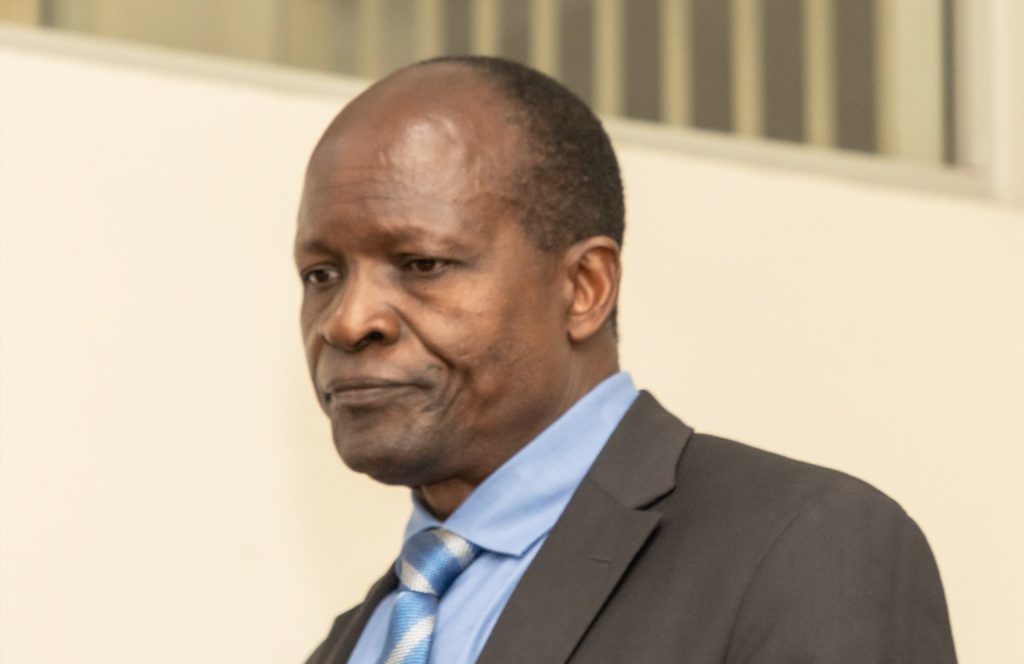Hearing of former Migori County Governor, Zachary Okoth Obado’s corruption case resumed this Monday, July 8, 2024, before Chief Magistrate Hon. Victor Wakumile at Milimani Anti-Corruption Court with prosecution witness, Mr. Robert Rono of the Ethics and Anti-Corruption Commission (EACC) retaking the stand.
Mr. Obado is being pursued criminally alongside his four children, Dan Achola Okoth, Scarlet Susan Okoth, Everlyn Zachary Okoth, and Jerry Zachary Okoth and 11 others for alleged massive theft of public funds.
Mr. Rono’s testimony in the two-day scheduled hearing was meant to, by and large, disclose how the former Governor and his co-accused hatched and executed the fraud against the County Government of Migori. Prosecution has lined up 59 witnesses to testify in a bid to prove the case against the Governor and co-accused.
The witness, who works for EACC as an Investigation Officer tabled key documents seized from the accused that also helped lay bare the nexus between the former Governor and his proxy in the conspiracy, one Jared Odoyo Oluoch Kwaga.
He first testified to a search conducted at the residence of Mr. Kwaga where he tabled seven letters written by Cooperative Bank of Kenya’s Regional Manager in charge of Parliament Road and Moi Avenue branches, Nairobi, Mr. Richard Misoi to Mr. Kwaga closing seven accounts for businesses that traded with the County Government of Migori.
Three of the accounts were held in the name of Mr. Kwaga who is also charged alongside Mr. Obado, one in the name of Atina Services, one for Swyfcon Engineering, another for Dolphus Software, and the last one for Joyush Business.
The witness, however, testified mainly regarding searches conducted in various residences and offices of the former Governor for Migori County vide Miscellaneous Application No. 63 of 2018 and the documents recovered therein relevant to the investigations.
From his official residence in Migori, the witness tabled a letter of offer for purchase of a town house No. C-1 in Loresho, Nairobi, from Kenya Power and Lighting Company (KPLC) Pension Scheme. It was purchased in the name of Jared Kwaga at a cost of Sh34,525,000. He also tabled a transactional slip by Jared Kwaga showing a deposit of Sh3,450,000 to the KPLC Pension Scheme.
- EACC alarmed by rising cases of budgeted corruption in counties
- Kikuyu elders call for lifestyle audit of politicians
From his residence in Uriri, the Prosecution tabled, among others, a handwritten list of 24 varied properties belonging to the Obado family. The list included the KPLC Pension Scheme Loresho house, a not finished 3bedroom house in Uriri; a quarry site on 6acre land that also had kes20 million worth of equipment in Migori County; a jaggery plant in North Sakwa; a filling station on Awendo/Migori Road; flats of about 20 units nearing completion in Migori; several vehicles and parcels of land in Migori County.
He further referred to other documents recovered, amongst them, the County Government of Migori Central Bank of Kenya (CBK) Revenue, Development and Recurrent accounts.
The matter was adjourned after the second-day of hearing on Tuesday and is now scheduled for a virtual mention on 1st August before hearing resumes on 11th, 26th, and 30th September 2024.
EACC undertook investigations in this case after receiving allegations that Migori County Government had made suspicious payments to multiple companies, totalling Sh1.98 billion. After investigations, most payments were found to have been lawfully made in respect to executed contracts whose works were confirmed in a verification exercise. However, payments amounting to Sh235 million remained unexplained and were deemed to have been fraudulently acquired from the County Government.
The unexplained amount, which the Commission found to be proceeds of corruption, including kickbacks directly sent by some companies to foreign universities as school fees for Obado’s children as well as high-end properties purchased for the family by the said contractors, have since been recovered through Alternative Dispute Resolution (ADR), following a civil recovery suit filed at the High Court.
The Commission will dispose of the seized properties by public auction in accordance with the Court orders issued by Justice Esther Maina.
Should the Court find the accused in the ongoing criminal case guilty, they will be convicted and sentenced in accordance with Section 48 of the Anti-Corruption and Economic Crimes Act, 2003, which provides for a maximum jail term of 10 years for each offence and a mandatory fine equal to two times the amount of any public funds lost or benefit acquired by the accused person.
Additionally, Section 64 of the Act bans convicted persons from appointment or election to any public office for a period of 10 years.
– BY OUMA OJANGO



